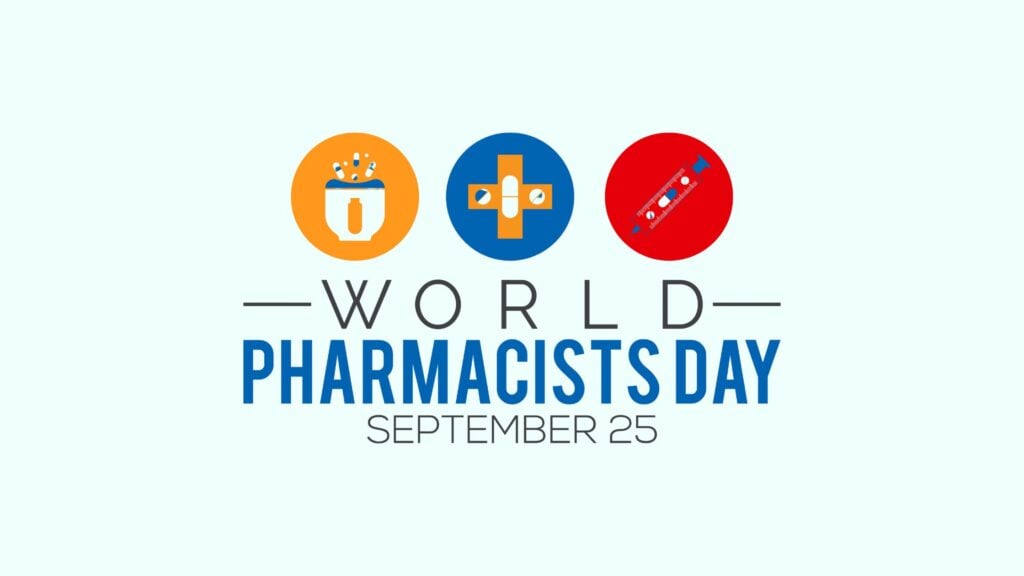Malnutrition: Symptoms, Causes, and Treatment Options
Malnutrition is a pervasive global health issue, impacting millions, particularly young chi...
SCAB Pharmacy

Join us in celebrating World Pharmacists Day 2025 and the contributions of pharmacists in the health industry! This annual event shines a spotlight on the invaluable contributions pharmacists make to global health. Pharmacists are integral to our healthcare systems, providing services such as:
Let’s explore the significance of this day and how we can all support these dedicated healthcare professionals.
World Pharmacists Day was established by the International Pharmaceutical Federation (FIP) in 2009, marking a significant step in acknowledging and promoting the vital role of pharmacists in improving global health. The day, celebrated annually, honors the establishment of the FIP in 1912 and acts as a dedicated time to advocate for the pharmacists’ contributions to health outcomes, ensuring the safe and effective use of medicines. This initiative by FIP underscores the pharmacists’ role in supporting the development of sustainable health systems and promoting awareness of their impact on healthcare.
September 25th holds a special significance as World Pharmacists Day, a date chosen to coincide with the anniversary of the International Pharmaceutical Federation’s (FIP) inception in 1912. In 2025, World Pharmacists Day will be observed on Thursday, September 25, 2025. Each year, this internationally recognized day sets the stage for various campaign activities and celebrations. The aim is to highlight the essential work pharmacists do in communities around the world, showcasing their commitment to public health and their role in ensuring patient safety and well-being.
The landscape of global health is becoming increasingly complex and interconnected, reinforcing the necessity to promote good health and sustainable health systems around the world while addressing existing health disparities. Many countries and organizations have devised new global health strategies designed to tackle pressing challenges, both current and future, such as limited access to healthcare, workforce shortages of medical professionals, antimicrobial resistance, climate change, air pollution, HIV, and emerging infectious diseases. Pharmacists play a crucial role in these strategies, ensuring medication safety and providing essential patient care within their communities, particularly in the formulation of treatment plans.
Within the vibrant tapestry of local communities, the role of pharmacists stands out as indispensable for ensuring the health and well-being of its residents, especially during World Pharmacy Week. The community pharmacist ensures the availability of medications, offering accessibility and convenience for patients. They are responsible for appropriate use of medicines, delivering vaccinations and preventive care while supporting public health campaigns, promoting rational antibiotic use, and improving health literacy. Pharmacists are often the first, and most trusted, point of contact, particularly in underserved areas, making them crucial in delivering essential healthcare services.
In the dynamic realm of healthcare, clinical pharmacists elevate patient care to new heights through their medication expertise and patient counseling. Pharmacists play a critical role in patient safety, ensuring that medications are dispensed correctly. They diligently detect potential drug interactions, providing counseling on medication use, thus acting as the final checkpoint before patients receive their prescriptions. By providing thorough medication reviews and counseling, pharmacists empower patients to manage their health effectively.
Pharmacists are instrumental figures in driving public health initiatives, serving on the front lines to ensure safe, cost-effective and accessible care for all. These healthcare professionals are pivotal in delivering vaccinations and preventive care, playing a vital role in clinical trials for new medications. By actively engaging in vaccination drives, pharmacists increase vaccine accessibility and uptake, protecting communities from infectious diseases. The pharmacist also promotes health awareness through education and outreach, playing a crucial role in creating healthier societies.
Medication adherence is a cornerstone of effective healthcare, and pharmacists play a vital role in ensuring patients follow their prescribed medication regimens. Through comprehensive patient education, pharmacists empower individuals to understand their medications, improving medication adherence and overall health outcomes, while also navigating the pathways for managing various ailments. They offer practical tips, tools, and ongoing support to help patients stay on track with their treatment plans, minimizing the risks of complications and hospital readmissions. This intervention fosters better management of chronic diseases.
One of the most critical aspects of a pharmacist’s role in patient safety is their ability to detect potential drug interactions, acting as a safeguard against adverse effects. Pharmacists possess in-depth knowledge of pharmacokinetics, pharmacodynamics, and biopharmaceutics, which enables them to identify and prevent harmful drug combinations. By conducting thorough medication reviews, pharmacists minimize the risk of adverse events, ensuring that patients receive the safest and most effective therapy possible. Their expertise in drug interactions and formulation helps protect patient health and well-being.
In the ongoing battle against chronic diseases, pharmacists emerge as indispensable allies, leveraging their expertise to enhance patient care and promote healthier lives. Pharmacists lead in pharmacovigilance, promote the responsible use of antibiotics (antimicrobial stewardship), and advocate for policy changes to improve health outcomes. They help patients manage their conditions effectively by providing personalized medication management, monitoring therapy, and offering valuable education. Their holistic approach reduces the burden of chronic diseases and enhances patients’ quality of life.
Workforce shortages across many countries are placing immense pressure on healthcare systems, leading to increased burnout among healthcare professionals, including pharmacists. The absence of professional workers sometimes means less qualified staff are filling crucial pharmacy roles, impacting the quality of care. This issue necessitates urgent attention to ensure patient safety and sustainable health outcomes, demanding innovative solutions to alleviate the strain on the pharmacy workforce and promote employee well-being within the profession.
Pharmacists face a myriad of regulatory hurdles and scope-of-practice limitations that hinder their ability to provide comprehensive patient care. Varied country regulations can restrict their involvement in vaccination programs, medication management, and chronic disease management, limiting the pharmacists’ impact on public health and their ability to compound necessary medications. Overcoming these barriers requires advocating for policy changes that recognize the full potential of pharmacists, allowing them to practice at the top of their license and contribute more effectively to improving health outcomes and reducing healthcare costs. This will contribute to more sustainable health systems in the long run, especially with the support of pharmacists in the industry.
In the rapidly evolving landscape of healthcare and pharmaceutical sciences, the need for ongoing pharmacy education and training is paramount. To remain at the forefront of medication management, pharmacokinetics, pharmacodynamics, and biopharmaceutics, pharmacists must continually update their knowledge and skills in the latest formulations and industry practices. The International Pharmaceutical Federation (FIP) plays a crucial role in this regard, setting standards and promoting best practices in pharmacy education worldwide. Ensuring access to high-quality pharmacy education is essential for maintaining patient safety and improving health outcomes.
Supporting pharmacists requires a multi-faceted approach that includes policy advocacy and patient engagement. By advocating for policies that expand the pharmacists’ scope of practice and recognize their contribution to healthcare, we can empower them to play a more significant role in patient care. Encouraging patients to actively engage with their pharmacists, seeking advice on medication adherence, and understanding potential drug interactions, ensures safer and more effective therapy. The International Pharmaceutical Federation (FIP) champions this cause, encouraging policymakers to prioritize investment in pharmacists to safeguard health.
World Pharmacists Day on 25 September 2025 is our opportunity to celebrate and make visible the pharmacists’ contributions to better health outcomes. This day provides a platform to highlight the essential role pharmacists play in medication safety, public health initiatives, and community healthcare, particularly during World Pharmacy Week. By acknowledging their dedication and expertise, we can foster greater appreciation for the profession and encourage more individuals to seek their valuable services. World Pharmacists Day also encourages colleagues from all sectors of the pharmacy profession to participate in campaign activities.
To fully leverage the expertise of pharmacists, policymakers should invest in pharmacy-led services and expand their role in healthcare. Patients can also make practical changes to better utilize pharmacists in their care. This includes preparing for pharmacist-patient consultations by bringing an updated medication list, asking questions about potential side effects, discussing adherence strategies, and exploring various pathways for managing ailments. By recognizing the pharmacist as a trusted healthcare partner, patients can optimize their medication therapy and improve their overall health and well-being. Pharmacists play a crucial role in chronic disease management within the industry.
Preparing for a pharmacist consultation can significantly enhance your medication management and overall health. Before you visit the pharmacy, gather all your current medications, including prescription drugs, over-the-counter medications (OTC), vitamins, and supplements. Writing down a list of your health conditions and any allergies you have can also be beneficial. The pharmacist needs all this information to collaborate with you and ensure medication safety and appropriateness, ultimately improving your health outcomes.
Asking your pharmacist questions is a proactive way to take control of your health, ensure medication safety, and understand the minor details of your treatment plan. Inquire about the purpose of each medication, the correct dosage, potential side effects, and any interactions with other drugs or food. The pharmacist is a wealth of knowledge when it comes to generic medication alternatives and will assist with helping you to manage medications, helping you improve medication adherence and reduce any potential harm to yourself. By fostering a strong relationship with your pharmacist, you can optimize your therapy and overall well-being.
Maintaining an updated medication list is crucial for medication safety and effective healthcare management. Include the name of each medication, dosage, frequency, and the reason for taking it. This list should be shared with all your healthcare providers, including your pharmacist and physician. In emergency situations, having this information readily available can prevent adverse drug events. Regularly updating this list will improve health outcomes and will help the pharmacists play an essential role in your care, and think health for you.

World Pharmacists Day on 25 September 2025 presents a perfect opportunity to engage your community in health awareness and support the vital work of pharmacists. Organize local clinic talks, vaccination drives, or school outreach programs, to improve community health. Partner with your local pharmacy to promote medication safety, adherence, and public health initiatives during World Pharmacy Week. By involving your community, you’re contributing to a healthier society. This collaboration demonstrates your support of the healthcare system and improves relationships with pharmacists.
Share the spirit of World Pharmacists Day by posting on social media using the hashtag #WorldPharmacistsDay. You could use captions such as, “Happy World Pharmacists Day! Thank you, pharmacists, for your dedication to patient care and medication safety,” or “Celebrating pharmacists today and their vital role in our health systems.” Another option would be, “Recognizing the impact of pharmacists on global health.” Additionally, encourage everyone to share educational posts on the importance and history of World Pharmacists Day using the hashtag #WPD2025. This easy action boosts awareness and amplifies the contributions of the pharmacist. It is a way to contribute to public awareness.
Malnutrition is a pervasive global health issue, impacting millions, particularly young chi...
SCAB Pharmacy

Welcome to a comprehensive guide on folic acid and folate, two crucial B vitamins that play...
SCAB Pharmacy

Physiotherapy, also known as physical therapy, is a healthcare profession dedicated to impr...
SCAB Pharmacy

Do you have any questions? Do not hesitate to contact us.